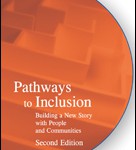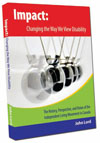John Lord, Founder of the Centre for Community Based Research, discusses Canada’s existing policy and practice framework for individualized funding for people with disabilities and highlights pockets of excellence that show promise for the future.
Independent Facilitation Video
John Lord describes Independent Facilitation as part of the Citizenship Conference in Vancouver in October, 2015
Belonging Lens
This Belonging Lens was presented at the New Story Group on Waterloo Region on October 15, 2013. The event was part of a two part series called Building a Community of Belonging: It Starts with Conversation.
Click here to see the Belonging Lens
Enhancing Social Inclusion
MAY 22 Inclusion PRESENTATION [Compatibility Mode] Enhancing Social Inclusion. A keynote address of the key elements that enhance social inclusion.
John identifies three key elements; the right values and principles, the right intentions and strategies, and the right facilitation. These ideas are grounded in the New Story and challenges us to think intentionally and critically about how to build inclusive communities.
Developments in Direct Payments
John Lord, Peggy Hutchison, and Brian Salisbury have a chapter in a New British book called Direct Payments.
Facilitating an Everyday Life
Independent Facilitation and what really matters in a New Story
Independent facilitation frees facilitators to be dedicated to citizens who experience vulnerability because of labels, disability, chronic illness, poverty, or aging. Facilitators are independent of biases from others such as service systems and funding bodies.
Order the book here – http://www.inclusion.com/bkfacilitating.html
Independent facilitation puts belief and hope in community because that is where relationships and safeguards play out for all of us.
Independent facilitation builds resilience and capacity in individuals, families, and communities.
Independent facilitation flourishes when it is embedded in community, in facilitator networks, and is supported by local action and government policy.
This book is for people like us, people who want to make a difference, who want to feel free to be dedicated to a person; to citizens who experience vulnerability. People who want to use an effective process that is a change maker. Independent facilitation is an emerging craft. Facilitators in the New Story believe that community is always the answer. We reject approaches that do not lead people to relationships in their community. And while independent facilitation may touch the service system to access supports for a person, it is independent of agendas, expectations, and accountabilities of service systems.
John, Barbara & Charlotte
Pathways to Inclusion, 2e
This book is an examination of various perspectives on disability that provide insightful discussion on the current need for social innovation to move vulnerable citizens from areas of exclusion to social inclusion. It offers a straightforward approach to addressing the organizational strategies that have been used in the past and highlighting areas for change.
2nd Edition can be purchased here.
To order: Click on “Add to Shopping Cart” then click on “View Cart” to continue placing your order
Friends & Inclusion: Five Approaches to Building Relationships
This book is all about relationships and their importance in building an inclusive life! It’s that simple and that complex. But that is true for all of us; it takes work to build and sustain friendships. If you happen to experience a disability, building relationships must be more intentional. We all need to Belong. Peggy, John & Karen describe their personal search and exploration of five approaches to building the good life that Karen enjoys. Let Karen be your mentor. She has it figured out for herself – with a little help from her friends.
For more information check out Peggy Hutchison’s website.
Impact: Changing the Way We View Disability
This is a story of resilience and possibilities, as people with disabilities take charge of their own lives and work with others to create positive change in their community. This book highlights 25 years of the Independent Living movement in Canada. It shows how the move to citizenship and consumer direction has had an enormous impact on the lives of Canadians with disabilities.
Order the book here – http://www.ilcanada.ca/upload/documents/bilingual-book-order-form—2011.pdf





New Story Commentary
The New Story challenges us to reflect on how we live and act in the world. Many questions emerge when we consider the idea that everyone should be able to access an everyday life. This thinking impacts our attitudes and our willingness to create welcoming neighbourhoods and communities.
We can think of the New Story as a narrative with citizenship at the core. When we can live full lives as citizens, we embrace diversity and participate with others in a range of community experiences. Our labels or disabilities should not limit the way we participate and contribute. Too many citizens have been silenced because of negative attitudes and structural barriers. New Story advocates work to reduce these barriers, while at the same time developing community alternatives that enable everyone to experience an everyday life.
Family networks and independent facilitation are examples of community alternatives that enhance the New Story. When combined with individualized funding, these new functions contribute significantly to building the resilience of individuals and families. Independent Facilitation is especially powerful when facilitators work from an inclusion framework that includes self-determination and community.